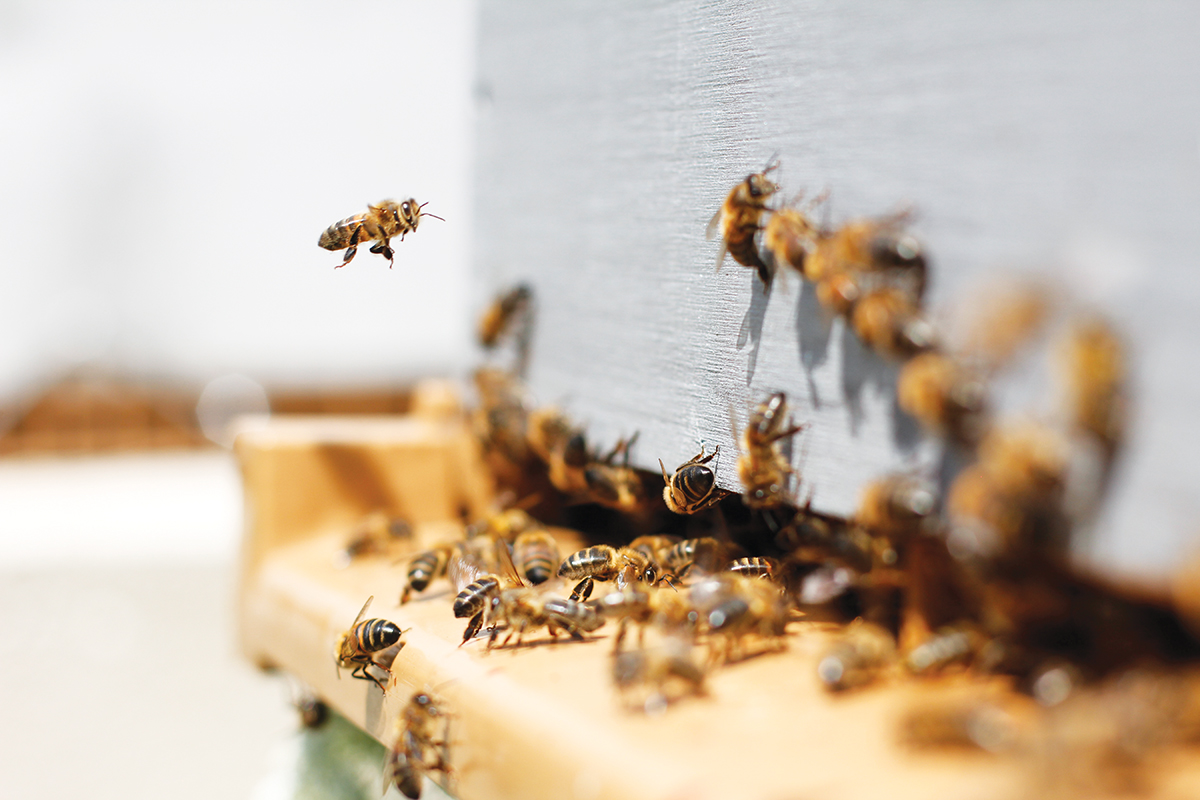WRITER | JULIE FORD
If the sight of a bee evokes feelings of fight or flight, or if an EpiPen is always on hand for a bee sting, then backyard beekeeping is for someone else. But for those who marvel at the insect world and can handle an occasional sting, beekeeping can be a richly rewarding endeavor.
People keep bees for many reasons – to increase the honey bee population, spend time in nature, learn something new, or for the fellowship of other beekeepers. While honey may be a beekeeper’s sweetest reward, the hardworking honey bee, Apis mellifera, is fascinating to observe, and it’s the only insect on the planet that produces food for humans.
Certified master beekeeper and master gardener Wrifton Graham along with his father, Bill Graham, are co-owners/instructors at Great Lakes Bee Supply in Galesburg and have been beekeeping for decades. “I find it peaceful to work with bees, and there’s something to watching them fly off into the distance to work,” explains Wrifton. “Most do it for the honey and for the pollination of our trees and flowers – we won’t have these without pollinators.”
Beekeeping is a year-round activity. It is not as difficult as one might think, and the room needed – about 3 feet by 3 feet – is surprisingly minimal. “You don’t have to check with neighbors, but depending on who you live next to, a peace offering of honey at the end of the season keeps everyone happy,” advises Wrifton.
Since bees travel 2 to 3 miles for food in any direction, neighbors may not realize a beekeeper is in the neighborhood. Wrifton says that anyone, with the exception of apartment dwellers, can do it, and no other livestock requires so little area. Yes, bees are considered livestock, and while detailed beekeeping rules can be found at pollinators.msu.edu, Wrifton says a lot of people just do it – there’s no smell, and a hive of 30,000 bees doesn’t present a larger sting threat to neighbors.
Learning where to start and what to do begins with online videos, books, or classes at a local beekeeping association (michiganbeekeepers.org lists many around the state). “There’s no single right way to beekeep,” says Wrifton. “There are wrong ways but no single right way; find out what’s best for you.” Learning from local, experienced beekeepers is especially important for understanding backyard beekeeping. Hive management varies across the US due to differences in geography and climate, so what works in one state may not work in another.
“The whole premise of beekeeping, in a nutshell, is observing the hive often enough, inside and outside, to understand what a healthy hive looks like,” explains Wrifton. “You need to look in the hive every 21 days to make sure all is okay.” The self-sufficient creatures gather their own food and water, clean out their hive, and raise their young, but beekeepers provide assistance if something goes wrong such as fungus, disease, beetles, or mites.
Once the decision is made to become a beekeeper, the initial start-up costs begin at around $500 and typically include:
- Langstroth hive box (most common due to universal parts) including the summertime screen bottom, ten frames, and the foundation where the bees live and build combs
- Hive tool for inspecting and maintaining the hive
- Beetle trap to protect the bee colony from the damaging small hive beetle
- Bee smoker to calm the bees when working in the hive
- Bee suit with veil and gloves
- Bees – called nucs (pronounced newks) or nucleus hive with five established frames of pollen, honey, brood (babies), workers, drones, and one Nucs are ordered from January to March for pick-up in late April or May.
Wrifton cautions beginning beekeepers against trying to reduce costs by buying bees in a package. “A package is cheaper than a nuc with its bees and queen in a box, but it’s not an established hive. It will take a lot longer for the bees to settle in – or, worse, if they don’t like their new hive box, they may fly away!”
As the hive grows each year a new hive box should be added, at an average cost of $200. As with any hobby, there’s always good, better, and best equipment that can increase the expense. “It may seem high to start, but once you purchase the first box, tools, and bees, the only extra cost is with adding boxes,” says Wrifton.
As springtime approaches, now is the time to decide if beekeeping is the family’s next adventure. No other livestock takes care of itself like the honey bee, the learning opportunities are endless, and the golden jars of honey produced in the backyard make life a little sweeter.
Helpful Resources:
greatlakesbeesupply.com
thehoneybeeconservancy.org
abfnet.org
xerces.org
March 8-9, 2019 Michigan Beekeepers’ Association Spring 2019 Conference, michiganbees.org
March 16, 2019, Southeastern Michigan Beekeepers Association 81st Annual Beekeeping Conference, sembabees.org








